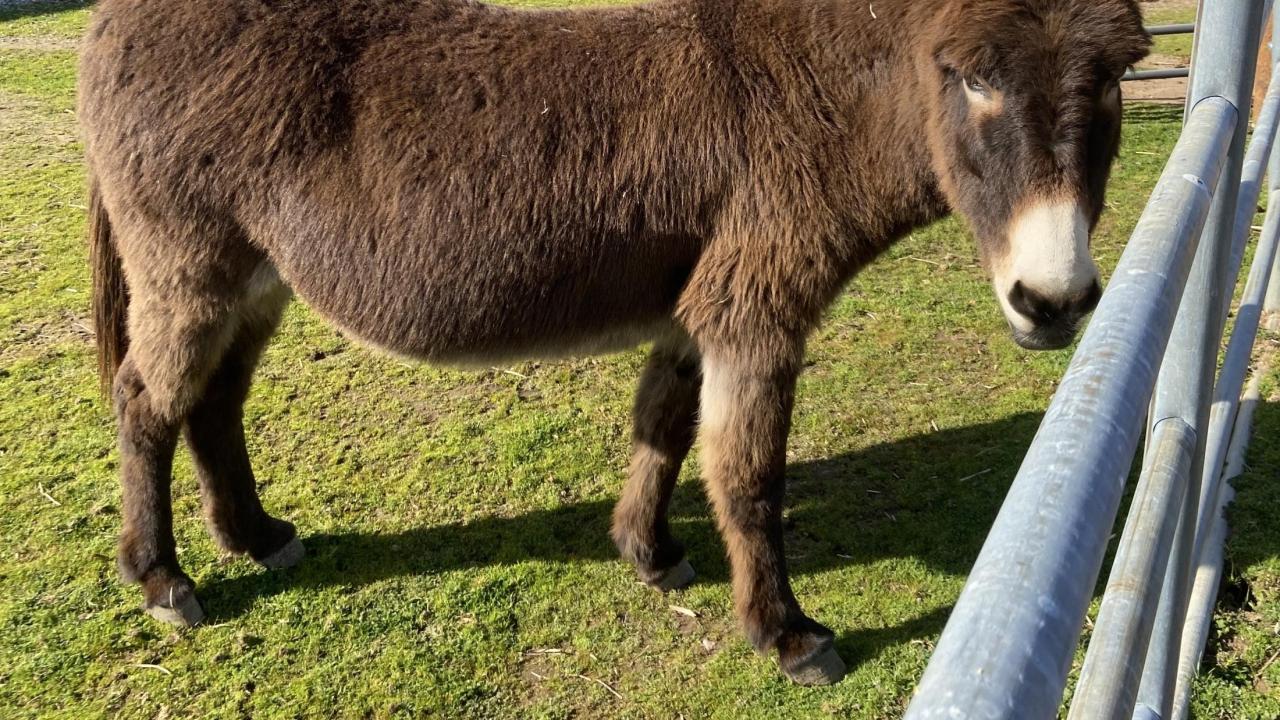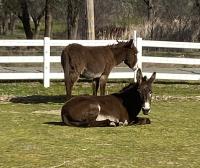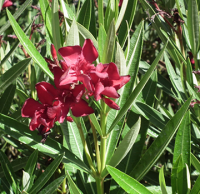
Donkey Saved After Oleander Poisoning
“Case of the Month” – February 2023
Lily, an 11-year-old female donkey, always has a good appetite. So, when she wasn’t eating one night several months ago, her owner Judy Croy knew something wasn’t right.
“She lets me know that when I come outside, I have a purpose – to feed her,” Croy joked.
Croy, who owns five donkeys, was uncomfortable with the situation and decided to stay with Lily for a few hours.
“Her behavior was so abnormal,” said Croy, who thought maybe it was colic.

Later that evening, her primary veterinarian prescribed a common pain killer and anti-inflammatory medication. By morning, nothing changed with Lily’s condition. An examination showed an elevated heartrate, and the veterinarian didn’t think it was presenting like colic. Instead, she suspected poisoning and Lily was transported to the Large Animal Clinic at the UC Davis veterinary hospital.
“When we arrived at Davis, the entire emergency team was waiting and helped us get her off the trailer immediately,” said Croy.
Faculty equine medicine specialist Dr. Fiona Wensley and Dr. Mallory Lehman, a resident with the Equine Internal Medicine Service, took the lead on the case, and the team started a series of tests to determine exactly what was ailing Lily.
“Donkeys are very stoic animals and don’t tend to show disease until they are very sick,” said Dr. Lehman. “We are so fortunate that her veterinarian recognized her signs quickly and recommended referral, as I think the quick referral made a huge difference in Lily’s outcome. Lily was an exceptionally nice donkey to work on – which may speak to how bad she felt initially but continued throughout her stay. Considering her history and elevated heart rate when she got to us, we knew we needed to do some further testing quickly to find the cause of her fairly non-specific signs.”
Tests showed that Lily had elevated kidney values consistent with acute kidney injury, a common side effect of poisoning. In addition, her triglycerides were mildly elevated, which is consistent with her not eating well prior to presentation. More troubling was her level of cardiac troponin, an indicator of heart muscle damage. Lily’s initial concentration of troponin was 41 ng/ml. Since a normal level in a horse is less than 0.07 ng/ml, her care team was quite concerned, and ordered a cardiac ultrasound, which showed a mild amount of fluid buildup around her heart and mildly thickened heart muscle walls.

The definitive indicator of the origin of these issues was determined when her blood test revealed a toxic concentration of oleandrin. Lily had eaten oleander, a highly poisonous plant.
Oleander is a common ornamental plant found throughout California in both home gardens and in commercial areas. All parts of the plant are toxic to both animals and people. Even the dried leaves can be very dangerous to animals which may find them palatable. Ingestion can cause diarrhea, heart arrhythmia, kidney disease, and even sudden death.
Lily was hospitalized for six days while recovering with supportive care, nutritional care, and anti-arrhythmic medications. In addition, she was given activated charcoal and IV lipid emulsion therapy to bind the toxins in her system. She even wore a continuous ECG monitor while in hospital for continual monitoring of heart rate and rhythm. Lily responded well to treatment, and her heart and kidney values normalized by the time she was discharged. Her heart arrhythmia resolved well, but she was prescribed medication to control it at home while her heart continued to heal.
Lily was brought home where Croy continued to nurse her back to health with the help of her other donkeys. She credits their ability to calm each other and lower stress levels. Her five donkeys were all abused or “untouchable” before she rescued them, and they are now a bonded herd. A follow-up visit by their primary veterinarian showed normal heart rhythm and that Lily was recovering well.
Croy is quick to point out that owning donkeys is much different than owning horses.
“Donkeys are so misunderstood,” said Croy. “Everybody thinks, ‘I’d love to have a donkey – they’re just horses with long ears.’ Nothing could be further from the truth. I’ve had horses since before I was a teenager, and I had to forget everything I knew (about horses) and start over (with donkeys) because they learn differently, they respond differently – they’re just not a horse. These donkeys have been an amazing journey for me.”
She is happy to report that Lily has made a full recovery, and she is back to her old self with the rest of her herd.
# # #
To learn more about oleander and other toxic plants, see the UC Davis Toxic Plant Garden website.
